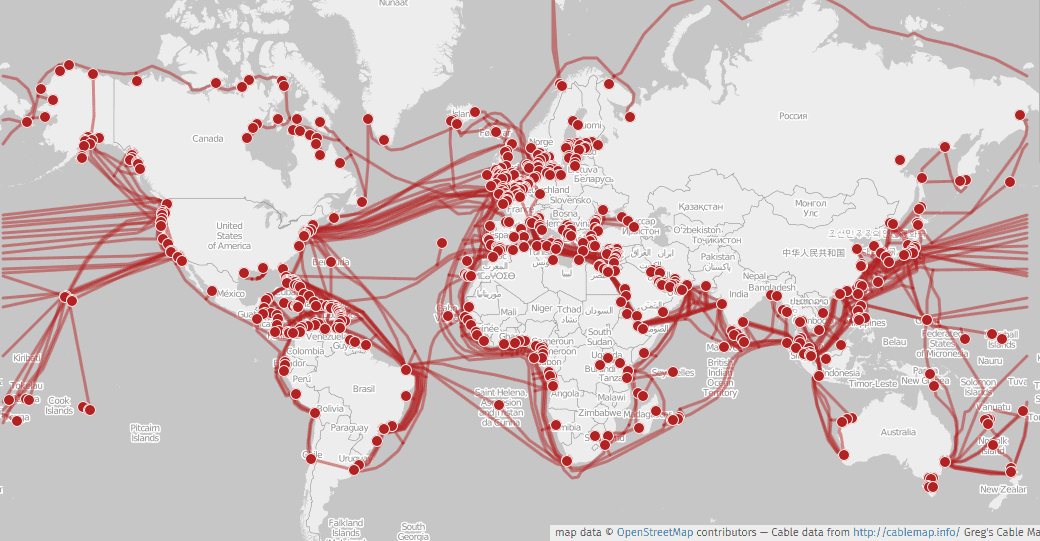
Credit: U.S. Navy, Creative Commons
Ninety-nine percent of international internet communications travel through undersea cables no thicker than a coffee cup before reaching their final destination. While private companies mostly own these fiber optic wires in the United States, whatever country they land in could, theoretically, have the opportunity to access their data.
And that’s what worries Team Telecom, a newly formalized interagency national security committee led by the Department of Justice that, in recent months, has focused its attention on America’s internet connections to China. At such a critical moment in U.S.-China relations, observers say the committee’s actions have to walk a fine line between safeguarding American data and national security and taking a potentially isolationist approach that cedes control over the world’s digital infrastructure.
When American telecom and internet companies want to lay new cables, they file their plans with the Federal Communications Commission. In the past, U.S. government officials from agencies like the DOJ and the Department of Homeland Security reviewed these requests. But in an April executive order, President Donald Trump formalized Team Telecom and directed the committee to review and revoke licenses that could constitute a national security risk.
It had its first test in June, when Team Telecom reviewed Facebook and Google’s newly proposed undersea cable system that would, for the first time, directly link Hong Kong and the United States. While internet information has long flowed between Hong Kong and the United States, it typically travels through different countries and cable networks to get from one place to the other. A direct link, analysts say, could redirect more traffic between the U.S. and Asia through Hong Kong.
“Technically, what you need to know is that while this cable doesn’t ‘open up’ traffic between the U.S. and Hong Kong — we currently exchange internet traffic with Hong Kong — it alters the routing of traffic and information,” said Nicole Starosielski, an associate professor at New York University and author of The Undersea Network. “In other words, the geography of the exchanges changes, and it would make Hong Kong a more attractive place through which to route one’s information.”
Paying attention to where your information goes is part of the supply chain, and as organizations are paying closer attention to supply chain risk management, the transmission of their data is critically important.
Gregory Touhill, former U.S. Chief Information Security Officer
With a direct link, financial traders might notice the nanoseconds-faster connection, but few else likely would. Amid heightened U.S. fears about Chinese interference and espionage, Team Telecom issued a recommendation against the proposed network, citing the possibility that the Chinese government could gain access to the Hong Kong end and collect data belonging to Americans. In its 78-page recommendation, it noted that the project’s Hong Kong backer, Pacific Light Data, is owned by China’s largest private broadband company, Dr. Peng Group, which works closely with state-run telecom companies.
“[The DOJ] evaluates ongoing concerns about [China’s] aggressive collection activities targeting U.S. data,” a DOJ spokesperson told The Wire. “Under [People’s Republic of China] law, PRC citizens and organizations may be compelled to provide assistance to the PRC government in its intelligence activities. A cable landing station in PRC territory, with a direct connection to U.S. communications infrastructure, therefore presents challenging issues for individual consideration.”
According to WireScreen, the data division of The Wire, Dr. Peng Group was set up in Chengdu, in southwest China’s Sichuan Province, and dropped out of the steel business to get into telecommunications. The company, which is listed on the Shenzhen Stock Exchange, is run by Yang Xueping, an entrepreneur. The company1See this Caixin magazine story on Dr. Peng here has partnerships with China Mobile, China Unicom and Huawei.
Facebook and Google2The world of undersea cables used to be dominated by telecom companies like AT&T and Verizon, which still operate several cables and landing ports. But about a decade ago, Google and Facebook entered the field to cut out the middleman, given the huge amount of bandwidth that each company uses. abandoned the Hong Kong connection in early September in response to Team Telecom’s recommendation. Instead, they requested permission to bring online cables connecting the United States to just Taiwan and the Philippines, which Team Telecom approved. Facebook also retracted a second application it had filed with Amazon to connect to Hong Kong “in light of current U.S. Government policy,” requesting to instead land in the Philippines.
Some have praised Team Telecom’s efforts to minimize risk. “From a national security standpoint, it’s due care and due diligence,” said Gregory J. Touhill, who served as the nation’s first Federal Chief Information Security Officer, under President Barack Obama. “They’re taking a risk-based approach regarding the transmission of United States citizens’ data.”
But Jonathan Hillman, the director of the Reconnecting Asia Project at the Center for Strategic and International Studies, in Washington, said that while securing data is important, the U.S. should be pursuing options that involve encryption and data protection rather than cutting off ties completely. “We should also be thinking about technical solutions to try to mitigate some of those risks,” he said. “I think the goal should be to allow the U.S. to operate more securely in places where we don’t have a high degree of trust… not to confine ourselves only to the areas that we trust.”
Currently, there are three undersea cables that connect the United States directly to China. The last time the federal government approved a cable connecting to China was in January 2017, a week before President Trump took office, in a venture that was backed by Microsoft and state-owned telecom companies from China and Taiwan. Some cables that connect the United States to Japan and Taiwan, meanwhile, are operated in part by Chinese state-run telecoms.

Credit: Greg Mahlknecht and Openstreetmap, Creative Commons
Trump’s executive order in April granted Team Telecom the power to retroactively review all of those previously approved licenses, and it can be seen as an extension of the U.S. fear over Chinese influence in U.S. telecommunications systems. Last year, citing national security and espionage concerns, the FCC denied a proposal from state-run telecom company China Mobile that would have allowed it to carry U.S. calls internationally. And since early last year, the Trump administration has been restricting Chinese telecom equipment firms Huawei and ZTE from operating telecom infrastructure in the U.S. as well as banning government employees from using their products.
Analysts say that data traveling from U.S. cables through China is not just a matter of security for personal data and intellectual property since the U.S. government also leases bandwidth on the privately owned cables. The government has only a small number of its own constructed cables, in part due to the high price of cable construction, which can be hundreds of millions of dollars.
“Paying attention to where your information goes is part of the supply chain, and as organizations are paying closer attention to supply chain risk management, the transmission of their data is critically important,” says Touhill, the nation’s former Chief Information Security Officer.
If Team Telecom continues with its opposition to connecting directly to China, experts say the United States might increase its cable connections to the Philippines or Singapore to support increasing data exchanges with Asia. Indeed, despite the disruptions, Facebook and Google are moving forward with their planned connection to Taiwan and the Philippines, which analysts say helps support the increasingly burdened undersea cable network.
“The fact that the cable is able to proceed in all legs except the Hong Kong leg is still a benefit to data transfer between North America and Asia,” says Joshua Fitt, who researches Asia-Pacific security matters at the Center for a New American Security. “Diversification is essential, and so the government wants to avoid a future in which China becomes the data switchboard between the United States and the rest of Asia.”
Two other Hong Kong cables are waiting on approval from Team Telecom, one backed by Facebook that would connect to California and another backed by Google that would connect to Guam. Facebook says it is “working with the appropriate government officials” to secure approval. Whether or not Team Telecom allows the projects to move forward will signal how severely the U.S. government is about avoiding Chinese territory.

Hannah Reale is a staff writer with The Wire. Previously, she reported for the New England Center for Investigative Reporting, The West Side Rag, and her college newspaper, The Wesleyan Argus. @hannahereale



